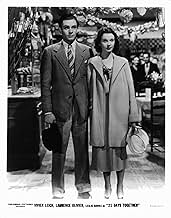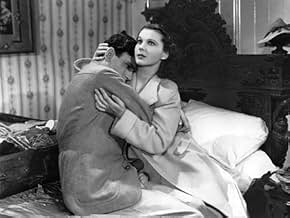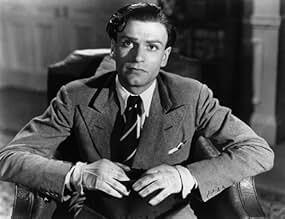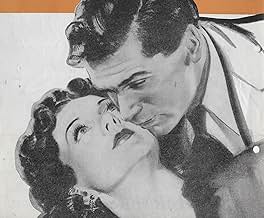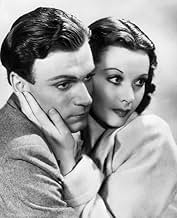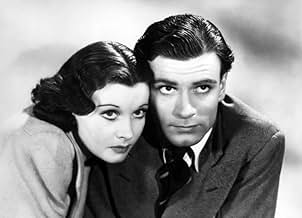AVALIAÇÃO DA IMDb
6,1/10
1,4 mil
SUA AVALIAÇÃO
Adicionar um enredo no seu idiomaAfter Larry accidentally kills his lover Wanda's estranged blackmailing husband, someone else is arrested for the crime. Larry and Wanda nervously await the verdict: if the innocent suspect ... Ler tudoAfter Larry accidentally kills his lover Wanda's estranged blackmailing husband, someone else is arrested for the crime. Larry and Wanda nervously await the verdict: if the innocent suspect is found guilty then Larry will give himself up.After Larry accidentally kills his lover Wanda's estranged blackmailing husband, someone else is arrested for the crime. Larry and Wanda nervously await the verdict: if the innocent suspect is found guilty then Larry will give himself up.
- Direção
- Roteiristas
- Artistas
Elliott Mason
- Frau. Grunlich
- (as Elliot Mason)
Howard Douglas
- Man Asking for Cigarette
- (não creditado)
- Direção
- Roteiristas
- Elenco e equipe completos
- Produção, bilheteria e muito mais no IMDbPro
Avaliações em destaque
You'll get hooked on this right away but then annoyed at the way it takes so long to get to the point. Director, Basil Dean's lugubrious pace and humourless direction tries too hard to build tension rather than developing the story or making us get to know his cast.
According to Mr Dean he was not entirely to blame. Studio boss Alexander Korda was so underwhelmed by Dean's direction that he started to re-shoot and rewrite scenes himself. This conflict gives the picture a disjointed feel but the main issue is that the balance is really wrong. About half the film is taken up by the (anti) climatic court case which is meant to get you on the edge of your seat. It achieves that ambition but only because you're yelling "get on with it!" This is one of the dullest court room scenes I've seen - where is William Powell or a Barrymore brother when you need them ? What's sacrificed for this pseudo-arty tension trope is that we don't get time to know the characters straight away. More time should have been devoted to that because it takes too long to draw you in.
On the plus side, it looks good, it's full of mood, clever lighting and the inevitable 1930s London fog - the camerawork also is pretty impressive. The acting, as you'd expect from this lot is first rate but it's the story which doesn't grab you. Such a tale about abuse, murder, deception and blackmail handled by another director could have been the most exciting thing since sliced bread but this is actually less exciting than that aforementioned piece of bread.
What does eventually makes you sit up and take notice is the brilliant cameo from Hay Petrie as a down and out ex-vicar. You then wish you'd been paying more attention earlier! That's what happens with this - once you've started you really want to find out what happens next but your brain keeps trying to switch off.
Despite what some reviewers have said, this is not a bad film - it's just frustrating because you know that it could have been made better. For example, had Hitchcock been in the chair this might have been a classic. As it stands it's just ok.
One interesting thing to see is Mr Olivier not playing the alpha male - as the weak willed looser, the unsuccessful brother, he's remarkably believable. That's until you realise that this young actor has, just a few weeks earlier married probably the most beautiful woman in the world.
According to Mr Dean he was not entirely to blame. Studio boss Alexander Korda was so underwhelmed by Dean's direction that he started to re-shoot and rewrite scenes himself. This conflict gives the picture a disjointed feel but the main issue is that the balance is really wrong. About half the film is taken up by the (anti) climatic court case which is meant to get you on the edge of your seat. It achieves that ambition but only because you're yelling "get on with it!" This is one of the dullest court room scenes I've seen - where is William Powell or a Barrymore brother when you need them ? What's sacrificed for this pseudo-arty tension trope is that we don't get time to know the characters straight away. More time should have been devoted to that because it takes too long to draw you in.
On the plus side, it looks good, it's full of mood, clever lighting and the inevitable 1930s London fog - the camerawork also is pretty impressive. The acting, as you'd expect from this lot is first rate but it's the story which doesn't grab you. Such a tale about abuse, murder, deception and blackmail handled by another director could have been the most exciting thing since sliced bread but this is actually less exciting than that aforementioned piece of bread.
What does eventually makes you sit up and take notice is the brilliant cameo from Hay Petrie as a down and out ex-vicar. You then wish you'd been paying more attention earlier! That's what happens with this - once you've started you really want to find out what happens next but your brain keeps trying to switch off.
Despite what some reviewers have said, this is not a bad film - it's just frustrating because you know that it could have been made better. For example, had Hitchcock been in the chair this might have been a classic. As it stands it's just ok.
One interesting thing to see is Mr Olivier not playing the alpha male - as the weak willed looser, the unsuccessful brother, he's remarkably believable. That's until you realise that this young actor has, just a few weeks earlier married probably the most beautiful woman in the world.
he film begins with two happy lovers (Laurence Olivier and Vivian Leigh) returning to her home. There, waiting for her is her husband--a man who she hasn't seen in three years. He demands money and then attacks Olivier--trying to stab him. In self-defense, Olivier kills the husband and dumps his body in an alley. He then visits his brother, a respected judge (Leslie Banks) and confesses. However, the brother surprisingly does NOT want him to go the police--which is odd, since it was a case of self-defense. It seems that he doesn't want this dirty laundry to be aired in public. For a time, things appear fine...until some other guy is arrested for the killing. Olivier cannot allow this to happen but his brother encourages him to be quiet--the defendant is sure to be found innocent. But, as the trial progresses, things look worse and worse for the defendant. And, all the while his brother, a respected judge, encourages the couple to leave the country and forget about the case. The problem is that Olivier's character has character--much more than his supposedly upright and respectable brother.
While the story is very simple and relatively easy to predict (though the ending was a bit of a twist), I liked the idea of two brothers who appear one way but are the opposite. Olivier's character is a bit of a rotter--gambling and living a rather frivolous life--but down deep, he has a conscience. His proper brother, however, is truly evil and can live with an innocent man being convicted and hung! Because it is a very good film, it is perplexing why Gainsborough Pictures shelved this movie for three years before finally releasing it. I'd love to know why.
While the story is very simple and relatively easy to predict (though the ending was a bit of a twist), I liked the idea of two brothers who appear one way but are the opposite. Olivier's character is a bit of a rotter--gambling and living a rather frivolous life--but down deep, he has a conscience. His proper brother, however, is truly evil and can live with an innocent man being convicted and hung! Because it is a very good film, it is perplexing why Gainsborough Pictures shelved this movie for three years before finally releasing it. I'd love to know why.
Although released in 1940 this picture was made in 1937, well before Leigh and Olivier were married. Producer Alexander Korda intended it as a career-boosting role for Leigh but, for whatever reasons, it was put-aside. Columbia bought the property in 1939 and released it after Leigh's success in "Gone with the wind".
The 1937 date explains what must seem to be an anomaly for modern audiences - the sympathetic treatment of the "Axis" characters, ie the German landlord and the Italian grocer.
Well-worth watching - the depth of talent in the supporting roles (Francis L Sullivan, Hay Petrie, Robert Newton etc) is notable.
The 1937 date explains what must seem to be an anomaly for modern audiences - the sympathetic treatment of the "Axis" characters, ie the German landlord and the Italian grocer.
Well-worth watching - the depth of talent in the supporting roles (Francis L Sullivan, Hay Petrie, Robert Newton etc) is notable.
Well played out story of a weak man(Olivier) who kills someone thru self-defense and then decides to hide the fact with his girlfriend(Leigh). His brother(running for Judge duties) helps in the cover-up. Unexpected ending a little disappointing, but follows with the character.
Apparently this is one of those Galsworthy dilemma stories. In it Olivier, early in his career inadvertently kills a man, the estranged husband of his new love. He is faced with the considerable struggle with conscience because a man has been blamed for the act and will face the music. What to do. What to do. We are put in the position of hoping all will somehow work out. I won't spoil the ending, but I will say that Olivier's character could have been sent to the gallows for terminal boredom. At no point did I really care one way or the other. He is selfish in many ways and rather cowardly. While the victim is made to have no redeeming qualities, his death really serves nothing other than that of a plot element. I suppose there is some of that stiff upper lip stuff going on, but at no time did I sit on the edge of my seat. Contrast this to the pain of Jean Valjean who faces a similar question. In that we all need to look inward. This just didn't ask much of me, and I was also greatly disappointed with the conclusion.
Você sabia?
- CuriosidadesThe film was shot in 1937 but released on January 7, 1940. William Dewhurst (Lord Chief Justice) died on October 26, 1937. His only child, Paul, died in 1937 fighting in the Spanish Civil War, only a few months before Dewhurst's own demise.
- Erros de gravaçãoAt the end, when Wanda (Vivien Leigh) is chasing Larry (Laurence Olivier) through the streets, she isn't carrying anything. The camera goes to Larry, and when it goes back to her, she's carrying a newspaper as she's still running. Once again the camera goes back to Larry, and the next shot of her, she once again isn't carrying a newspaper but stops to buy one then continues to run after him.
- ConexõesFeatured in The Making of a Legend: Gone with the Wind (1988)
Principais escolhas
Faça login para avaliar e ver a lista de recomendações personalizadas
- How long is 21 Days Together?Fornecido pela Alexa
Detalhes
- Data de lançamento
- País de origem
- Idiomas
- Também conhecido como
- Três Semanas de Loucura
- Locações de filme
- Southend-on-Sea, Essex, Inglaterra, Reino Unido(Kursaal amusement park visited by Larry and Wanda)
- Empresa de produção
- Consulte mais créditos da empresa na IMDbPro
- Tempo de duração
- 1 h 12 min(72 min)
- Cor
- Proporção
- 1.37 : 1
Contribua para esta página
Sugerir uma alteração ou adicionar conteúdo ausente

